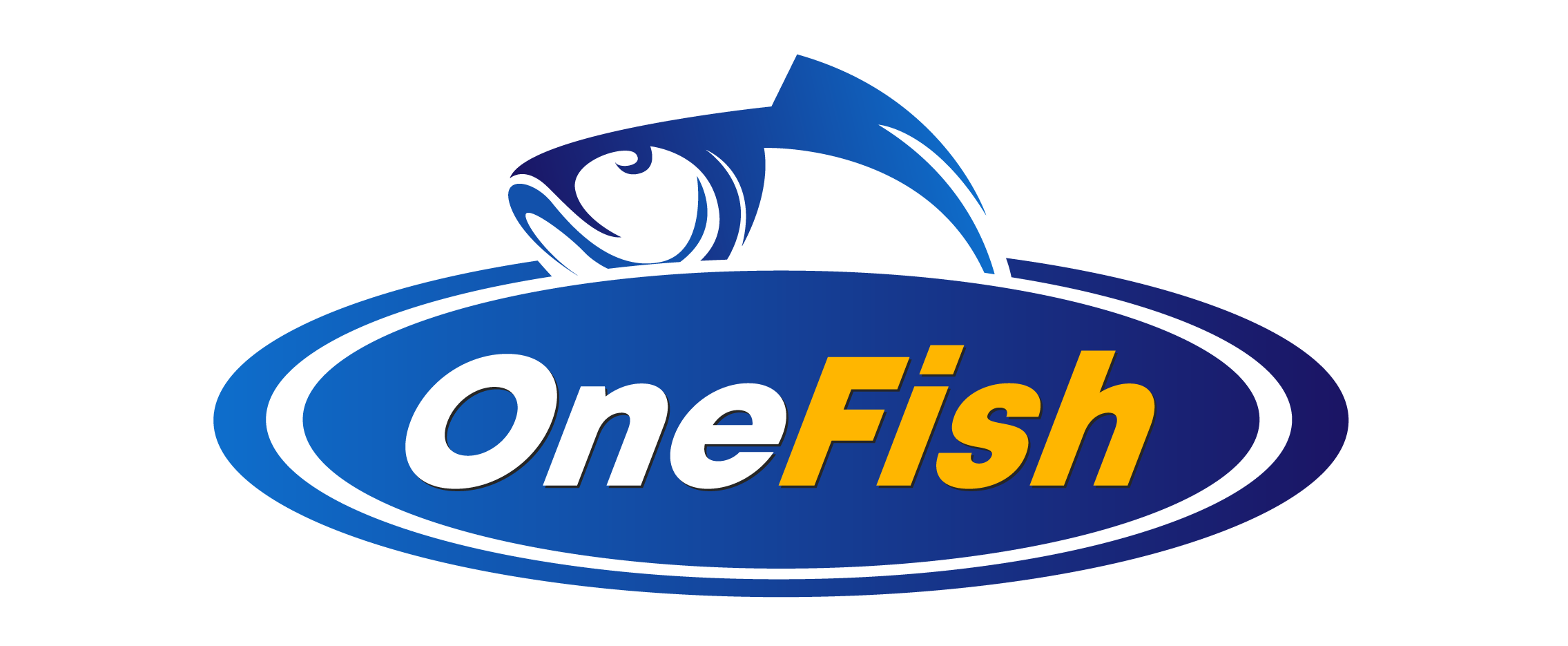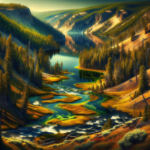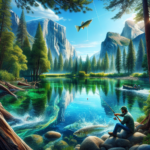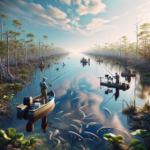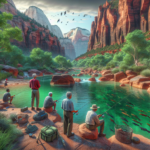Fishing in Acadia National Park: Coastal Waters and Inland Lakes
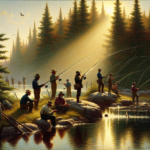
Introduction
Did you know that Acadia National Park, located on the rugged coast of Maine, offers some of the most diverse and rewarding fishing experiences in the United States? Whether you’re casting a line in the park’s pristine inland lakes or exploring its rich coastal waters, Acadia provides a unique angling adventure for both novice and experienced fishermen.
This article will guide you through the essentials of fishing in Acadia National Park, covering everything from the best fishing techniques and species information to top fishing spots and seasonal considerations. We’ll also delve into the necessary gear, safety tips, and conservation practices to ensure a successful and responsible fishing trip.
Understanding the intricacies of fishing in Acadia is crucial for maximizing your experience. Whether you’re looking to catch a trophy fish, enjoy a peaceful day by the water, or participate in a local fishing event, this guide has you covered.
Background/Context
Historical or Cultural Significance
Acadia National Park, established in 1916, is one of the oldest national parks in the eastern United States. The park’s rich history is intertwined with the cultural heritage of the Wabanaki people, who have fished these waters for thousands of years. Today, Acadia continues to be a cherished destination for anglers, offering a blend of historical significance and natural beauty.
Geographical Overview
Located on Mount Desert Island and several smaller islands, Acadia National Park spans over 47,000 acres. The park’s diverse landscape includes rocky coastlines, dense forests, and serene inland lakes. The climate is characterized by cool summers and cold winters, with the coastal waters influenced by the Atlantic Ocean and the inland lakes offering a more sheltered environment.
Key Points/Details
Fishing Techniques
Technique Overview
Fishing in Acadia can be broadly categorized into two main techniques: freshwater fishing in inland lakes and saltwater fishing along the coast. Fly fishing, spin fishing, and trolling are popular methods used in the park.
When and Where to Use
Fly fishing is particularly effective in the park’s inland lakes and streams, especially during the spring and fall when insect hatches are most active. Spin fishing and trolling are more versatile and can be used both in freshwater and saltwater environments. Coastal fishing is best during the summer months when fish are more active in the warmer waters.
Recommended Gear
- Fly Fishing: 5-7 weight rods, floating and sinking lines, a variety of dry flies, nymphs, and streamers.
- Spin Fishing: Medium action rods, spinning reels, monofilament or braided lines, and a selection of lures and live bait.
- Trolling: Heavy action rods, trolling reels, downriggers, and deep-diving lures or live bait rigs.
Species Information
Species Overview
Acadia’s waters are home to a variety of fish species, including brook trout, landlocked salmon, smallmouth bass, and mackerel. Each species has unique habits and preferred habitats, making the fishing experience diverse and exciting.
Best Practices
For brook trout and landlocked salmon, focus on the park’s inland lakes and streams. Use fly fishing techniques with appropriate flies that mimic local insect life. Smallmouth bass can be found in both freshwater and brackish environments, and are best targeted with spin fishing gear and lures that mimic small fish or crayfish. Mackerel are abundant in coastal waters and can be caught using trolling or spin fishing techniques with shiny lures or live bait.
Location Information
Top Fishing Spots
- Jordan Pond: Known for its clear waters and abundant brook trout and landlocked salmon.
- Echo Lake: A popular spot for smallmouth bass and perch.
- Somes Sound: The only fjord on the east coast of the United States, offering excellent coastal fishing for mackerel and other saltwater species.
- Seal Cove Pond: A lesser-known spot with good populations of brook trout and smallmouth bass.
Regulations and Licenses
Fishing in Acadia National Park requires a valid Maine fishing license, which can be purchased online or at local retailers. Anglers must adhere to state regulations, including catch limits, size restrictions, and seasonal closures. It’s essential to check the latest regulations before your trip to ensure compliance.
Seasonal Considerations
Seasonal Variations
Fishing conditions in Acadia change throughout the year. Spring and fall are prime times for fly fishing in inland lakes and streams, while summer offers the best coastal fishing opportunities. Winter fishing is limited due to ice cover on inland lakes, but ice fishing can be an option for the adventurous angler.
Best Times to Fish
The optimal times to fish in Acadia are early morning and late afternoon when fish are most active. Seasonal peaks include spring (April to June) for brook trout and landlocked salmon, summer (July to September) for smallmouth bass and mackerel, and fall (September to November) for a variety of species as they prepare for winter.
Events and Tournaments
Event Overview
Acadia National Park hosts several fishing events and tournaments throughout the year, including the annual Acadia Fishing Derby and various local fishing contests. These events provide a great opportunity to meet fellow anglers, learn new techniques, and compete for prizes.
Preparation Tips
To prepare for a fishing event, ensure your gear is in top condition, practice your casting and retrieval techniques, and familiarize yourself with the event rules and regulations. Arrive early to secure a good spot and take advantage of any pre-event briefings or workshops.
Tips and Best Practices
General Tips
- Always check the weather forecast before heading out to ensure safe and comfortable fishing conditions.
- Use local bait and lures that mimic the natural food sources of the fish you’re targeting.
- Practice catch and release to help maintain healthy fish populations.
Avoid Common Mistakes
- Not checking local regulations: Always verify the latest fishing regulations to avoid fines and penalties.
- Using the wrong gear: Match your gear to the species and fishing technique for the best results.
- Ignoring seasonal patterns: Fish behavior changes with the seasons, so adjust your strategies accordingly.
Advanced Techniques
- Mastering the double haul cast for fly fishing to achieve greater distance and accuracy.
- Using fish finders and sonar technology to locate fish in deeper waters.
- Experimenting with different retrieval speeds and patterns to trigger strikes from hesitant fish.
Gear and Equipment Recommendations
Essential Gear
- Fishing rod and reel appropriate for your chosen technique.
- Fishing line (monofilament, braided, or fly line).
- A variety of lures, flies, and bait.
- Tackle box with essential tools (pliers, line cutters, hook removers).
- Fishing license and regulation guide.
Optional Gear/Upgrades
- Polarized sunglasses to reduce glare and see fish more clearly.
- Waders for fly fishing in streams and rivers.
- Fish finder or sonar device for locating fish in deeper waters.
- Waterproof gear and clothing for comfort in varying weather conditions.
Where to Buy or Rent
Local shops in Bar Harbor and other nearby towns offer a range of fishing gear and equipment for purchase or rent. Online retailers like Bass Pro Shops, Cabela’s, and Amazon also provide a wide selection of fishing gear suitable for Acadia’s waters.
Safety and Conservation
Safety Tips
- Always wear a life jacket when fishing from a boat or near deep water.
- Be aware of weather conditions and seek shelter during storms.
- Carry a first aid kit and know basic first aid procedures.
- Inform someone of your fishing plans and expected return time.
Conservation Practices
- Practice catch and release to help sustain fish populations.
- Respect local wildlife and avoid disturbing nesting areas or habitats.
- Follow all fishing regulations and guidelines to protect the ecosystem.
- Dispose of fishing line and other waste properly to prevent harm to wildlife.
Planning Your Trip
Accommodations
Acadia National Park offers several campgrounds, including Blackwoods, Seawall, and Schoodic Woods. For those preferring more comfort, nearby towns like Bar Harbor provide a range of lodging options, from hotels and motels to bed and breakfasts.
Travel Tips
Acadia is accessible by car via Route 3, with the nearest major airport located in Bangor, Maine. During peak season, consider using the Island Explorer shuttle bus to navigate the park and reduce traffic congestion.
Additional Activities
Beyond fishing, Acadia offers a wealth of outdoor activities, including hiking, biking, kayaking, and wildlife watching. The park’s scenic drives and historic sites provide plenty of opportunities for exploration and relaxation.
Frequently Asked Questions (FAQs)
Do I need a fishing license to fish in Acadia National Park?
Yes, a valid Maine fishing license is required to fish in Acadia National Park. Licenses can be purchased online or at local retailers.
What are the best times of year to fish in Acadia?
The best times to fish in Acadia are during the spring (April to June) and fall (September to November) for inland species, and summer (July to September) for coastal species.
Can I fish in both freshwater and saltwater in Acadia?
Yes, Acadia offers both freshwater and saltwater fishing opportunities, with a variety of species available in each environment.
Are there any fishing tournaments in Acadia National Park?
Yes, Acadia hosts several fishing events and tournaments throughout the year, including the annual Acadia Fishing Derby.
Conclusion
Fishing in Acadia National Park offers a unique and rewarding experience, with diverse species, stunning landscapes, and rich cultural history. By understanding the best techniques, species information, and top fishing spots, you can make the most of your angling adventure. Remember to follow safety guidelines and conservation practices to ensure a sustainable and enjoyable experience for all. Whether you’re a seasoned angler or a beginner, Acadia’s waters are waiting to be explored.
So pack your gear, get your fishing license, and head to Acadia National Park for an unforgettable fishing trip. Happy fishing!
